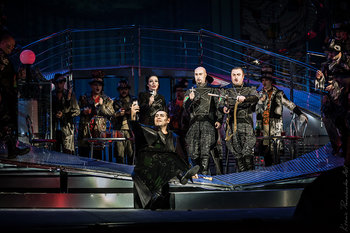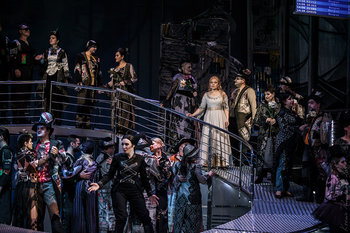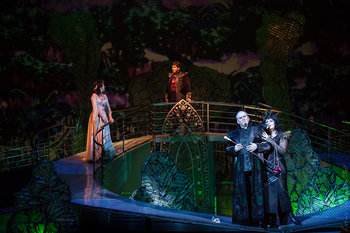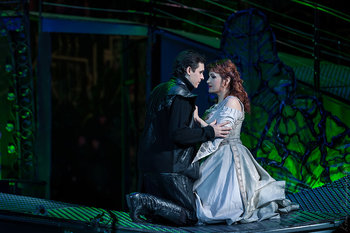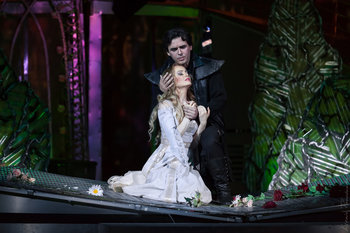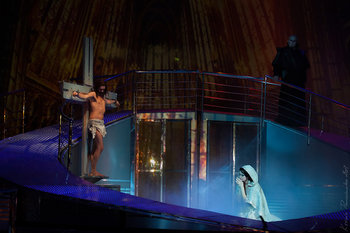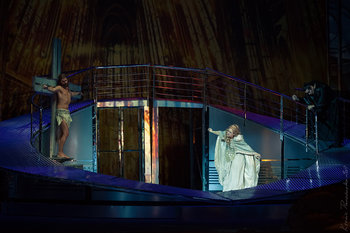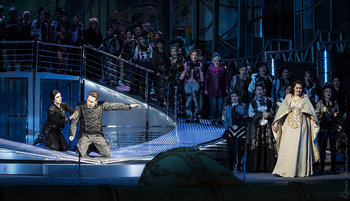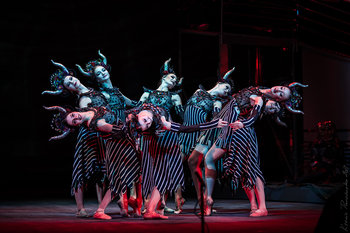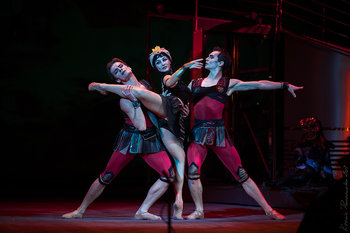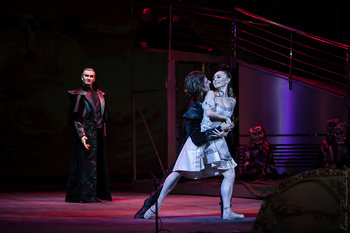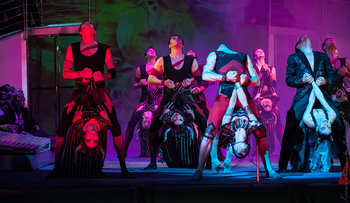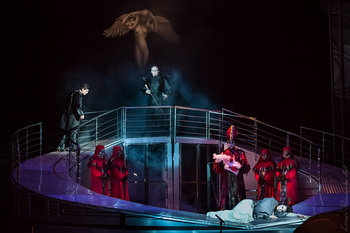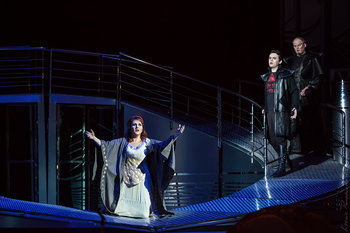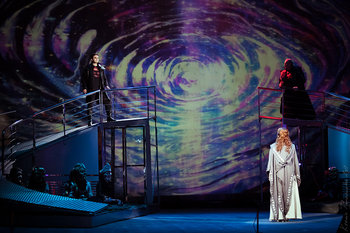Upcoming shows
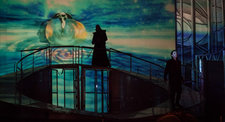
- Conductor of the premiere update:
- Alla KULBABA
- Production director:
- Mario CORRADI
- Director of the premiere update:
- Mykola TRETIAK
- Choirmaster of the premiere update:
- Oleksandr TARASENKO
- Scenographer:
- Andrii ZLOBIN
- Costume designer:
- Ganna IPATIEVA
- Ballet rehearsal coach:
- Tetiana BELETSKA
- Mask creator:
- Viktor GUKAYLO
- Concertmasters:
- Nataliia ROMENSKA
- Maiia SHLIAPOCHNYK
- Kostiantyn FESENKO
- Directors who lead the performance:
- Viktoriia KOVNIR
- Olga MONETOVA-FEDOROVA
- Dar’ia IAROVA
- Prompters:
- Nataliia GONTSOVSKA
- Roman BUDZIAK
- Literary translation:
- Larysa MAMUNYA
- French language consultant:
- Nina FILOPONENKO
SUMMARY
ACT ONE
Scene One
In his laboratory Faust reflects bitterly on the failure of his attempts to fathom the deep meaning of existence. At dawn he decides to end his life with poison, but as he is ready to take the fatal poison he hears peasant girls singing an aubade. Faust despises their happiness and tries again to kill himself. The girls are joined by reapers. They sing the joy of Easter and thank God for the fertile earth. Faust curses God who has not granted him love or faith; he curses science, religion and the supreme virtue of the scientist: patience. Thus summons Satan to his side.
Mephistopheles, dressed “en vrai gentilhomme”, as a real gentleman, appears and offers his services. What does Faust want? Riches, glory, power? Faust declares the he yearns for the good that encompasses them all: youth. Mephistopheles is ready to grant him youth at a “trifling” cost: while on earth Mephistopheles will serve Faust, “down there” Faust must serve him. To win Faust’s indecision Mephistopheles conjures up the vision of a young and beautiful girl: Marguerite. Faust sign the contract and Mephistopheles transforms him into a young man and promises him that he will meet Marguerite “this very day”.
Scene Two
To celebrate the soldiers’ departure to war the entire community gathers for a big party. Valentin, Marguerite’s brother, is the Commander and in the middle of the general merriment expresses his concern for his young sister whom he’s going to leave alone. Siebel, a young boy in love with Marguerite, promises to look after her during his absence. Wagner, a friend and a fellow soldier, tries to entertain the soldiers with a popular song – but he’s being interrupted by Mephistopheles who succeeds in making the soldiers sing a blasphemous song about the golden calf and the infernal powers. As they wake up from his spell, the soldiers invite Mephistopheles to join them in drinking. Mephistopheles tells fortunes: Wagner will die in battle, flowers will wither in Siebel’s hands and Valentin will be killed by someone known by Mephistopheles. Disgusted by the wine offered to him, Mephistopheles conjures up a better vintage and proposes a toast to Marguerite. Incensed by his behavior, Valentin draws his weapon, which breaks mid-air. Having understood that the person facing them is a diabolical figure, the soldiers try to neutralize him using their weapons in the shape a cross.
Faust is anxious to meet Marguerite and Mephistopheles promises to make her appear very soon. The whole group comes back and rushes into a swirling waltz. Siebel looks for Marguerite, but as she appears, Mephistopheles turns him away from her. Faust, stricken by her beauty, offers his arm to her, but she refuses. She protests that she is neither a “demoiselle”, nor a beauty. As she appeared so she disappears and amidst Faust’s disappointment and Mephistopheles’ amusement, the crowd resumes the waltz.
ACT TWO
In Marguerite’s garden Siebel is preparing a bouquet he wants to leave at the doorstep of his beloved one, but – according Mephistopheles’ prediction – the flowers wither as he touches them. Thus he dips his fingers in holy water and the spell disappears. Mephistopheles introduces Faust in the garden and shows him Siebel, his rival. Then he instructs Faust to wait for him as he fetches a more alluring gift than flowers. Faust perceives the magic atmosphere, “divine and innocent” that surrounds Marguerite’s space. Mephistopheles returns with a casket of jewels confident that they will have a greater impact than flowers on Marguerite’s heart.
Marguerite cannot stop thinking at the young man who offered her his arm. He sees him as the man of her dreams and sings the song of the King of Thule’ who until his death kept a golden goblet with the image of her lady-love sculpted in it. She notes the casket and decides to open it. She covers herself with jewels and, in front of a mirror, whishes her admirer could see her now.
Martha, her neighbor, suggests that she keeps the jewels which she thinks are a gift from the gentleman who had offered his arm to her.
Mephistopheles and Faust arrive. Mephistopheles brings Martha the sad news of her husband’s death in the battlefield. Martha tries to find consolation in Mephistopheles and tries to persuade him to marry her. Faust and Marguerite go away and Faust begins to woo the young girl. Marguerite, frightened by Faust’s kisses, tries to run away. Mephistopheles calls upon the forces of night so that Marguerite yields to Faust’ love. The spell works. Marguerite gives in and gives herself to Faust.
ACT THREE
Scene One
Marguerite is pregnant with a child of Faust, but he is gone without leaving or sending news. She goes to Church to ask for forgiveness but Mephistopheles follows her up to the threshold of the Church and torments her, first cursing her, and then making her believe that she is forgiven.
Scene Two
The soldiers come back from the war. Siebel tries in vain to prevent Valentin from going back home so that he does not see Marguerite’s condition. Faust and Mephistopheles come back. Faust feels guilty for what he has done and Mephistopheles thus suggests he himself sings a serenade in which he ironically offers Marguerite “la bague au doigt”, the wedding ring. An enraged Valentin rushes out determined to revenge his sister’s honor. In the ensuing duel Faust, helped by Mephistopheles, kills Valentin. In front of the entire community, before dying, Valentin curses his sister,
Scene three
Faust has definitely taken the road to perdition. The last step before his final damnation is the Night of Walpurgis, i.e. his participation in a magical and orgiastic ritual during which he will see all the great women lovers of the past, present and future, a ritual outside time and space intended to destroy the natural order of things and to celebrate the infernal powers. The mountain opens to reveal, dancing, men and women of all times, figures like Helen of Troy and Cleopatra. But at the moment the dances reach the most frantic peak, the vision of Marguerite appears to Faust. Faust, who has not completely lost his humanity, decides to meet her again.
Scene four
Marguerite is in a prison. Upon seeing her Faust would want to save her and flee with her. But Marguerite knows that the only way to save Faust from the contracts that binds him to Satan is to give her life for him. In a flash she sees the happy and lost moments of their first encounter and their night of love. Mephistopheles, feeling that he is about to lose Faust’s soul, tries to convince the two lovers to flee from prison. His appearance frightens Marguerite who implores the angels to save Faust and her soul. As she falls to the ground Mephistopheles exults “judged!”. “Saved!” replies an angelic choir. “Christ has risen!”. Easter announces, with the resurrection, forgiveness and reconciliation with God. As Marguerite’s soul ascends to heaven, Faust is left alone to continue his search on earth.

